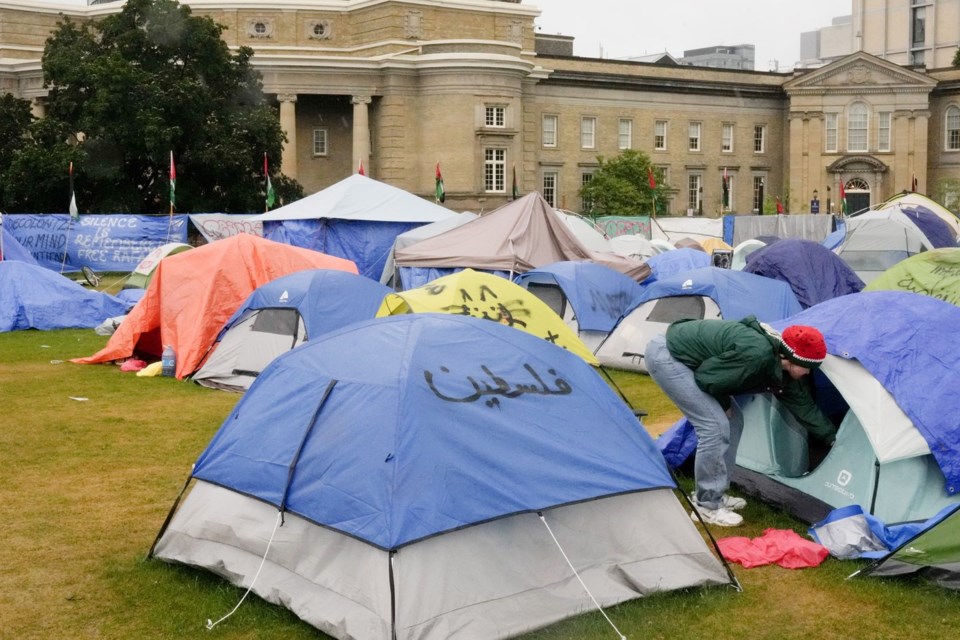TORONTO — The University of Toronto has suffered irreparable harm from a pro-Palestinian protest encampment that has seized control of part of its downtown campus, an Ontario judge said Tuesday in ordering demonstrators to dismantle the site.
The injunction issued late Tuesday afternoon orders the protesters to take down tents and structures by 6 p.m. Wednesday and bars them from impeding access to university property, putting up new tents or structures, or using the site without permission between the hours of 11 p.m. and 7 a.m.
It also gives police the authority to arrest and remove anyone who knows about the order and contravenes it.
In his ruling, Ontario Superior Court Justice Markus Koehnen said that while there is no evidence the encampment participants have been violent or antisemitic, the demonstration has taken away the university's ability to control what happens on the area known as King's College Circle.
The case law is clear that this amounts to irreparable harm, the judge wrote.
"In our society, we have decided that the owner of property generally gets to decide what happens on the property," Koehnen said.
"If the protesters can take that power for themselves by seizing front campus, there is nothing to stop a stronger group from coming and taking the space over from the current protesters. That leads to chaos."
The protesters have controlled access to the area in a way that excludes those who disagree with it, as well as those who "simply want to use front campus as an attractive recreational space," he added.
The judge said the harm to the university if the encampment is allowed to remain would be greater than the harm to the protesters if it is taken down, noting protesters will still be allowed to demonstrate in ways that don't involve camping or staying overnight.
On Tuesday evening, encampment protesters were removing signs from the outside fences. A man entered the encampment, taunting and swearing at encampment students, who didn’t react or respond.
The group would not clarify whether they planned to comply with the court order. However Sara Rasikh, a graduate student who has acted as a spokesperson for the camp, said they try to make decisions by reaching a consensus.
The Toronto Police Service said in a brief statement posted to X late Tuesday that it will enforce the court's order but hopes protesters will leave on their own to avoid police taking action.
"The 6 p.m. deadline applies to the protesters. While we won't disclose operational details, the court order states that police action is at our discretion. We are finalizing those details now," the statement said.
A spokesperson for the university said the decision "will restore King’s College Circle for the use of all members of the U of T community."
"We trust that those in the encampment will abide by the court order and vacate the encampment before the court-imposed deadline. Anyone who chooses to remain in the encampment after that deadline will be subject to consequences under university policy and the law," the school said in a statement.
The protesters set up camp on May 2 and previously said they would stay put until the school agrees to their demands, which include disclosing and divesting from investments in companies profiting from Israel's offensive in Gaza.
Sima Atri, a lawyer who represented the protesters in the injunction hearing, said the decision was based on a single legal principle -- who owns private property.
“This decision only rules on one specific tactic, and there are many other ways to continue to build pressure for the demands that students have and for the broader Palestine movement,” Atri said.
The court ruling said the university has procedures in place to consider requests for divestment and has offered the protesters an expedited process.
"It is now time for the protesters to peacefully dismantle the encampment and focus their energies on building support within the group that will investigate divestment and within the broader university community to persuade both groups that divestment is a worthy goal," the judge wrote.
"Persuasion will not be achieved through occupation but through reasoned discussion."
Mohammad Yassin, who was at the encampment Tuesday after the ruling was issued, said the group's "resolve is stronger than ever."
“The presence of police on our campus is a stark reminder of the methods to which our administration will go to maintain their complicity in genocide,” he said.
The university applied for an injunction late last month after the protesters ignored a trespass notice and deadline to leave.
The school asked the court to authorize police action to remove protesters who refuse to go, and to bar protesters from blocking access to university property or setting up fences, tents or other structures on campus.
The university initially sought the injunction on an urgent basis because the encampment is near Convocation Hall, where graduation ceremonies were scheduled to take place over several weeks in June.
The court heard the application over two days last month, after most of the ceremonies were done. No major disruptions were reported.
This report by The Canadian Press was first published July 2, 2024.
Paola Loriggio and Sheila Reid, The Canadian Press

